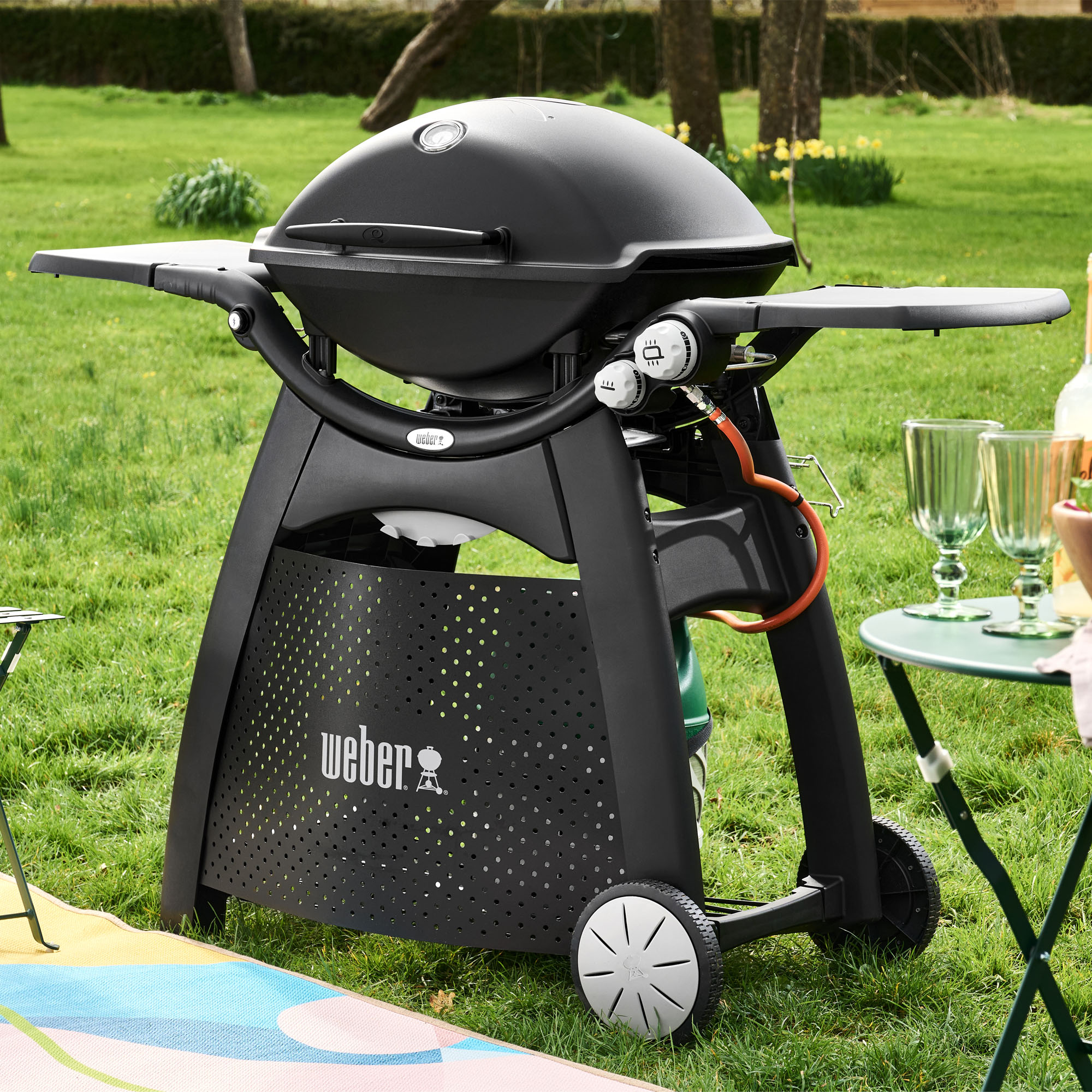Weber Q3200 gas barbecue review – tried and tested
Our Weber Q3200 barbecue review puts this compact and quick-to-assemble two-burner gas BBQ to the test

A compact and easy-to-manoeuvre BBQ that offers quick and easy two-burner gas grilling with minimal assembly and set-up times. We just wish it looked a little more stylish for the price
-
+
Gas is quick to light, clean burning and a reliable heat source for hassle-free grilling
-
+
Compact build good for smaller gardens
-
+
Large wheels make it easy to move
-
+
Quick assembly in under an hour
-
-
Lacks style
-
-
Build feels plasticky and a little cheap for the price
-
-
Takes a while to get up to temperature compared to other options
-
-
Not much grease protection for the burners
Why you can trust Ideal Home

The Weber Q series is the brand's entry-level range of gas barbecues, designed to offer the ease and convenience of gas grilling at a relatively affordable price point.
Weber's Q series offers three options, the smallest Q1000 or Q1200, the medium-sized Q2000 or Q2200, and the largest model, the Weber Q3200 which is the option we tried and tested for this review.
A gas barbecue will pretty much always cost more than a charcoal counterpart, however, if you regularly fire up the barbie then we think a gas option is well worth the investment for three main reasons. Firstly there's the quick and easy lighting – simply hook up the gas canister and press the ignition button rather than messing around with dirty charcoal and fire lighters.
Then there's the clean burn – unlike charcoal, gas produces very little smoke which means you won't come away from your cookout with clothes and hair stinking to high heaven. And, cooking temperatures are steadier, easier to maintain, and more reliable, so you can grill in the comfort of knowing your sausages or burgers are going to be thoroughly cooked through.
The Weber Q3200 has the largest grilling area of the Q series at 468 square inches (enough for 14 burgers) and is the only BBQ in the Q collection to have two independent gas burners for greater control over direct and indirect heat. We put it through its paces to see if it deserves a spot in our round-up of the best BBQ you can buy.
Weber Q3200 gas barbecue: specifications
- Fuel type: Liquid Petroleum Gas (refillable cylinder sold separately)
- Gas burners: 2
- Main burners: 6.36kW
- Dimensions (lid open and side tables extended): H141 x W127.5 x D76.2cm
- Dimensions (lid closed and side tables extended): H110.5 x W127.5 x D53.3cm
- Cooking area: W63 x D45cm
- Cooking grates: Porcelain-enamelled cast iron
- Wheels: 2
- Weight: 37.6kg
- Assembly: 2-person self-assembly
- Colour options: Black


Amy is one of the Ideal Home team's product testing experts and spent two days in a field in Somerset putting multiple bestselling BBQs through their paces.
She unboxed and assembled the Weber Q3200 to test the ease of self-assembly, then fired up the heat to grill a range of foodstuffs including halloumi and vegetable skewers, sausages, burgers, and even a spatchcock chicken.
Weber Q3200 gas barbecue: unboxing and assembly
The Weber Q3200 gas barbecue arrives packaged in a single box and requires self-assembly.
We had to move the BBQ from the driveway into the back garden ready for assembly, and at 37.6kg in weight, this was a two-person job. Annoyingly the outer box doesn't have any handles which made this slightly trickier. However, we tested several BBQs on this review day and despite still being a significant weight, the Weber Q3200 was by far the lightest of the bunch.

Once we'd manhandled it into position the next step was unpacking all of the components ready for assembly. A lot of parts come wrapped in plastic for protection which isn't the most environmentally friendly, but sadly this was the case with all of the BBQs we tested.
Weber recommends that assembly of the Q3200 is a two-person job, and we would agree as some sections need holding in place whilst being screwed together which would be difficult alone.
All in all, there are 20 assembly steps required to build the Weber Q3200. This may sound like a lot to the flat-pack novice, but considering many BBQs we tested on the day featured 40+ assembly stages, this is a good BBQ for the less DIY-inclined. However, you will need your own screwdriver as Weber doesn't include one in the box.

Overall the instructions were pretty easy for two BBQ-building novices to follow. The only tricky part came in the assembly of the base which had a couple of confusing and unclear instructions.
The grill came mostly pre-assembled and just needed to be slotted into the base. However, it was at this point that we realised we'd made an error in the base assembly so we had to go back and take some of the base apart before attaching the grill.

Between the two of us, we fully built the Weber Q3200 barbecue in 1 hour and 10 minutes, but we spent 20 of those minutes taking the base apart to re-do a step we missed. Overall this was the fastest and easiest gas barbecue to assemble out of all of the options we tested.
The Q3200 box also included a battery for the electric ignition and a disposable drip tray for the base which meant we could assemble and use the BBQ in the same day without having to buy any extra parts. The only thing not included (other than the screwdriver for assembly) was a battery for the detachable grill light.
Weber Q3200 gas barbecue: design
Compared to the other BBQs we tested on the day, the Weber Q3200 was built in a jiffy, so we had plenty of time to stand back in the ad hoc outdoor kitchen and admire our handiwork before we got cooking.
And, to be honest, the appearance of the Q3200 is a little underwhelming compared to the look you can get for a little more investment. The body of the Q3200 is mainly plastic casing, and all of the components feel a little flimsy considering its price point.
The BBQ comes with a (very plasticky looking) branded side panel to shield the view of the gas canister from the front and back, but the base is open from the sides and rear so the canister is visible from all other angles.
The folding side arms are a good size, and easy to fold up or down as required, although they do feel a bit flimsy compared to the more robust arms on other BBQ models. We also missed there being any hanging hooks on the side arms – there are three hooks on the front of the BBQ, but they're very low down which requires uncomfortable bending and meant tongs and spatulas tended to hit us on the shins whilst we were cooking – not ideal!
We tested five gas barbecues on the testing day, and this option definitely looked the cheapest of the lot design-wise, but how would it fare on the all-important grilling? We donned our aprons and fire-proof gloves to find out.
Weber Q3200 gas barbecue: performance
Unlike the cheaper models in the Weber Q series, the Q3200 offers two separate gas burners that can be operated independently. There's an outer circle for indirect heat and an inner section for direct grilling.
Getting either of these burners going is super simple thanks to the electric ignition which lights the gas grill at the press of a button – far easier than piling in charcoal and hoping a fire lighter catches light as you need to with a charcoal BBQ.
The only downside is that we found the gas flames quite tricky to see as there wasn't much visible flame action, so we had to keep checking the grill was actually lit before we got familiar with its performance.
The two large burner dials are on the right-hand side and are very easy to use with clear graphics to show the heat levels.

The Weber Q3200 has the largest grill area of all the Weber Q models – 63 x 45cm compared to the Q2000 and Q2200's 54 x 39cm of grill space, and the Q1000 and Q1200's 43 x 32cm. However, cooking space is still a little smaller compared to the other gas BBQs we tested.
It also comes with a warming rack included which is a useful addition, although it did take up a fair amount of grilling space when it was added on, and although you can still cook underneath it, it made flipping food over a little tricky.
Handily, there are hooks at the back of the base stand to hang the warming rack when it's not in use, so there's less chance of losing it in a flurry of burger cooking.

The Weber Q3200 also has a built-in thermostat on the lid to make it easier to tell when you've reached optimum grilling temperature. However, this was quite small, and wasn't the easiest to read compared to other grills.

Our first test was to get the BBQ up to 250 degrees to try out cooking some halloumi and vegetable skewers on the direct high-heat burner.
We were in an open field for the tests, and conditions were cool and very windy so it took about 15 minutes on full pelt to get the grill up to temperature with the lid closed. In a more shielded location, we think it probably would have been quicker, although heat-up time was still noticeably slower than other models such as the Weber Spirit II E-310 gas barbecue.
Opening the lid to add our skewers to the grill caused the temperature to drop pretty quickly as the body of the grill doesn't have a lot of insulation, (and the wind didn’t help), but once the lid was closed again it regained temperature fairly quickly and took about 12 minutes for our food to cook through. It definitely didn't retain the heat as well as the Weber Spirit II E-310 or the Everdure Force gas barbecue though.
Because this is a gas grill rather than charcoal, we did miss some of that classic flame-grilled taste, but the veg and halloumi both got some nice char lines and were cooked through.

Next up, it was time to give some corn on the cobs a quick chargrill, and then to grill some meat-free sausages and burgers on a medium direct heat whilst we added the corn on the cob to the warming rack to cook through.
The warming rack allowed space for four corn on the cobs to stay toasty, although it took up a good chunk of grilling space with just under half the grill covered. The back part of the grill was still operational – if a bit fiddly to access – once the rack was added.
In 15 minutes everything was evenly cooked and we got some char lines on the sausages and burgers, although as with the halloumi skewers, we struggled to get them super crispy. This could be due to the lack of heat reflectors, or 'Flavorizer Bars' as Weber terms them, over the burners.
This also meant that there isn't the same protection for the burners that other gas BBQs benefitted from. The grill is shaped to let any grease run into the drip tray, but some will inevitably slip through the grill plate, as well as food debris, that then ends up landing directly on and under the burners. This potentially leads to blocked holes in the burners and makes the BBQ fiddly in terms of how to clean.

Weber Q3200 gas barbecue: verdict
So should you buy the Weber Q3200 gas barbecue? Well, overall we think this is a good entry-level gas BBQ. Especially if you're looking for an option that's compact, lightweight and easy to wheel in and out of the garage, and offers reliable cooking results.
In our opinion, the Weber Q3200 just has a few downsides. Firstly there are its looks, if you're opting for the budget Weber Q1000/1200 or Weber Q2000/2200 then we'd let the plasticky and flimsy feeling design slide, but the £600+ Q3200 BBQ is competing with models that offer a lot more style for that price point, and it feels a little disappointing in build quality for that investment.
The price tag is justified by the addition of two gas burners rather than the Q1000/1200 or Q2000/2200's single burner. But without the burner vaporisers that the similarly priced Weber Spirit II offers, we couldn't achieve quite the same crispy grill on our food, and the burners are harder to clean and prone to clogging, so we're not sure if they're worth the extra investment.
Overall, if you're looking for an entry-level gas barbecue then we'd save some cash and opt for the Weber Q1000/1200 or Weber Q2000/2200 models instead, and if you're willing to spend a little more for a better multiple burner grilling experience, then we think the Weber Spirit II offers better performance and overall value.
Weber Q3200 gas barbecue: how we tested
For the purposes of this review the Ideal Home team spent two days in a field in Somerset putting a range of bestselling barbecues through their paces.
We unboxed and assembled each BBQ to test the ease of self-assembly, then fired up the heat on each one to grill a range of foodstuffs including halloumi and vegetable skewers, sausages, burgers, and even a spatchcock chicken.
We also debated design details, compared specifications and price points, and came up with our verdicts on value for money.
Click here to find out more about how we review products on Ideal Home.
Get the Ideal Home Newsletter
Sign up to our newsletter for style and decor inspiration, house makeovers, project advice and more.

Amy is Ideal Home’s Sleep Editor and the Ideal Home Certified Expert on Sleep. She's spent the last four years researching and writing about what makes for the best night’s sleep during the day and testing out sleep products to find the best-in-class by night. So far she’s clocked up over 10,000 hours of pillow, duvet, and mattress testing experience.
Our go-to for all things sleep-related, she’s slept on and under bestselling products from Simba, Emma, Hypnos, Tempur, Silentnight, Panda, and many many more.
As a hot sleeper, Amy is always on the lookout for the most breathable bedding, but she also leads a wider team of testers to ensure our product testing encompasses both hot sleepers, cold sleepers, front sleepers, back sleepers, side sleepers, and everything in-between.
-
 This £200 limited-time discount makes this Dyson vacuum cheaper than I’ve ever seen it - run don’t walk to Argos for this bargain
This £200 limited-time discount makes this Dyson vacuum cheaper than I’ve ever seen it - run don’t walk to Argos for this bargainIt's the most affordable Dyson on the market right now
By Lauren Bradbury
-
 Martin and Shirlie Kemp’s pastel flower beds have given their Victorian renovation a romantic look - how you can get the look
Martin and Shirlie Kemp’s pastel flower beds have given their Victorian renovation a romantic look - how you can get the lookTheir pastel garden is the cottage garden inspo you've been looking for
By Kezia Reynolds
-
 IKEA has just launched a massive 96 new products - but these are the only pieces you need to pay attention to
IKEA has just launched a massive 96 new products - but these are the only pieces you need to pay attention toThe classic STOCKHOLM collection just got even better
By Kezia Reynolds